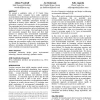Free Online Productivity Tools
i2Speak
i2Symbol
i2OCR
iTex2Img
iWeb2Print
iWeb2Shot
i2Type
iPdf2Split
iPdf2Merge
i2Bopomofo
i2Arabic
i2Style
i2Image
i2PDF
iLatex2Rtf
Sci2ools
100
click to vote
CHI
2008
ACM
2008
ACM
A bright green perspective on sustainable choices
We present a qualitative study of 35 United States households whose occupants have made significant accommodations to their homes and behaviors in order to be more environmentally responsible. Our goal is to inform the design of future sustainable technologies through an exploration of existing "green" lifestyles. We describe the motivations, practices, and experiences of the participants. The participants had diverse motivations ranging from caring for the Earth to frugal minimalism, and most participants also evidenced a desire to be unique. Most participants actively and consciously managed their homes and their daily practices to optimize their environmental responsibility. Their efforts to be environmentally responsible typically required significant dedication of time, attention, and other resources. As this level of commitment and desire to be unique may not generalize readily to the broader population, we discuss the importance of interactive technologies that influe...
CHI 2008 | Environmental Responsibility | Human Computer Interaction | Keywords Sustainable Interaction | Most Participants |
| Added | 30 Nov 2009 |
| Updated | 30 Nov 2009 |
| Type | Conference |
| Year | 2008 |
| Where | CHI |
| Authors | Allison Woodruff, Jay Hasbrouck, Sally Augustin |
Comments (0)

